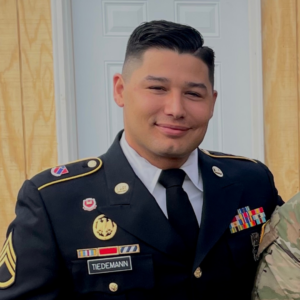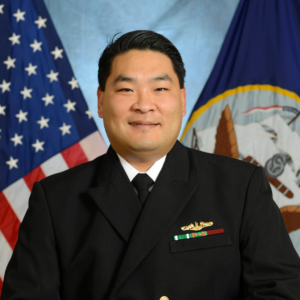With Interviews from Adam Tiedemann and Chris Jackson
Dear Military Veterans & Reserves,
At Meyer Najem, we are filled with gratitude and appreciation for our veterans and current reserve military personnel for their unwavering commitment and sacrifice. Your dedication to serving our country is a testament to your courage and selflessness.
In the face of adversity and uncertainty, you stand as a beacon of hope and security, ensuring our freedom and safeguarding our way of life. Your sacrifices, both seen and unseen, are the cornerstone of our nation’s strength.
To our reserve military personnel, Adam Tiedemann (Army National Guard) and Chris Jackson (Navy) you carry the torch of duty with honor and distinction. Your tireless efforts, often far from home and loved ones, inspire us all. Your resilience and dedication to protecting our nation are nothing short of remarkable.
To our veterans, Dan Lawson (Air Force), John Grosvenor (Navy), Brandon Oliver (Air Force), Eric Garcia (Marines), Zachary Shirer (Army), Chris Platts (Marines & Army National Guard), Mathew Pierce (Army), Magnus Di Fabio (Marines), Joe Myren (Marines), Mike Adkins (Army), and Randy Hertle (Marines), your service does not fade with time; it is etched into the very fabric of our nation’s history. Your stories, experiences, and the values you carry forward are a source of inspiration and a reminder of the price of freedom.
As we enjoy the freedoms and opportunities that you have secured for us, we must always remember that freedom isn’t free. It is earned through your courage, sacrifice, and unwavering commitment.
Today and every day, we honor you, salute you, and thank you for your service. You are the embodiment of patriotism, and your sacrifices will never be forgotten. May you find the peace and prosperity that you have worked so hard to protect.

Adam Tiedemann
Army National Guard

Chris Jackson
Navy
1. Did you know that you wanted to go into construction before signing up for the military?
Adam: No, but with growing up in a small town it was that type of work you found yourself doing during the summer months. I enlisted at 17, so it didn’t leave much time for a “career” before the Army.
Chris: Not at all. I enlisted in the Navy back in August 2001. At the time, I was a sophomore at Florida State University and about to launch a career in the nuclear field. When I left active duty in 2014, I worked in oil & gas in Oklahoma City. With the changing geopolitical landscape of 2016, I was laid off and searching for a new industry—not wanting to link my career to global challenges outside of anyone’s control.
I landed a new career as a manufacturer’s representative for a Daikin dealer in Jacksonville 2016, thinking “Florida is hot and everyone needs air conditioning.” After a few years of being a “sales guy”, I realized my passion was much more in the operational side of things and solving problems. This led me to become a PM for mechanical contractors and ultimately to Meyer Najem.
2. What do you love most about being an active member of the military?
Adam: For me, it is being able to have both a military and civilian career, simultaneously. I think the best part about being a reservist or national guard is being able to do both, and being able to choose if they align with each other or be completely different.
Chris: I enjoy serving my country and “shaking things up” a couple of times per quarter. The Navy Reserve has given me the opportunity to flex my leadership and decision-making muscles in fast-paced situations without a clear “right” answer. This directly translates to my civilian career and makes me a better project manager.
3. Are there any commonalities between the construction industry and being in the military?
Adam: From my experience with construction and the military, the biggest commonality is that everyone has a role to play, and a job to do; that’s what makes the machine work as a whole. With that being said, it is also the biggest difference. With the military you don’t hear “not my job, not my problem.” Everyone knows everyone’s job. We work together to finish the job, even if it means going out of your way to help. It is a team effort from start to finish.
Chris: There are many similarities between the construction and military service. Particularly at Meyer Najem, we take pride in our work and the comradery amongst the team that is built upon mutual trust. This is in lockstep with my experiences in the military and something that I have been looking for in a private company.
4. What advice would you give to someone who is active in the military and is looking to start their career in construction?
Adam: Do some research and have a background in it. If you don’t have a background or experience in a trade, understand that it’s going to be like the military starting out, you are going to have to start from the bottom and work your way up. Also, use your military education benefits to take classes part-time. There are multiple courses for project management, estimating, and scheduling that can help give you an advantage.
Chris: There are not many industries and professions that break down the traditional “blue collar” and “white collar” roles and responsibilities. I believe the construction industry merges these two types of workers/individuals and is similar to many military occupations. Commercial construction gives you the opportunity to get out of the office and do something that matters. Meyer Najem is a servant of the community and we take pride in the work we do.
5. How can the construction industry attract more members of the military?
Adam: Job fairs, reaching out to Family Readiness Groups, visiting National Guard and Reserve engineer units, and becoming a more recognizable name in the military and veteran community. Most military members, whether they know they are getting out or a last-minute decision, do not fully explore their options before leaving the military. They are not fully aware of the opportunities that are available to them. With Meyer Najem working with programs such as Operation New Uniform and on several VA Hospital projects, it makes the company name more recognizable and attractive to those veterans leaving the service.
Chris: The one-million dollar question that everyone’s trying to answer. Given the current political landscape and military policies, many people are looking for opportunities to transition out of the military. I believe there has been a negative stigma attached to the construction industry, as a whole, which was fueled by GenX and Millennial pushing high school students to post-high school education as the only path for success. I think it starts with engaging the local Veteran support networks and Transition services at local military bases. These services can get the “one-on-ones” to connect with transitioning personnel and open a conversation.
6. What can companies (Meyer Najem) do more of to help support our active military members and reservists?
Adam: What Meyer Najem has done already, which is great, is to provide military members the opportunity for military leave. Then the active military members won’t have to use their PTO for mandatory training.
Chris: Continue the support and spread the word. I believe many people do not realize that many companies have employees who are still affiliated with the Guard or Reserve.
